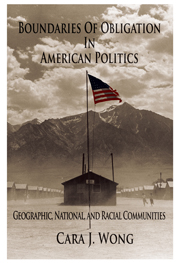Book contents
- Frontmatter
- Contents
- Acknowledgments
- Preface
- Boundaries of Obligation in American Politics
- 1 Community and Special Obligations
- 2 The Boundaries of Imagined Communities
- 3 Imagined Gates and Neighbors
- 4 Restricting National Boundaries
- 5 Blurring the Color Line
- 6 Conclusion
- Appendix
- References
- Index
- Titles in the Series
4 - Restricting National Boundaries
Published online by Cambridge University Press: 05 June 2012
- Frontmatter
- Contents
- Acknowledgments
- Preface
- Boundaries of Obligation in American Politics
- 1 Community and Special Obligations
- 2 The Boundaries of Imagined Communities
- 3 Imagined Gates and Neighbors
- 4 Restricting National Boundaries
- 5 Blurring the Color Line
- 6 Conclusion
- Appendix
- References
- Index
- Titles in the Series
Summary
This land is my land, this land ain't your land…
(Schoolyard version of the Woody Guthrie song, “This Land is Your Land”)During his 1996 presidential campaign, Pat Buchanan proposed the idea of building a physical barrier along the entire southern border of the United States to rival the Great Wall of China (Ogden 1996). The goal of this 3,200-kilometer wall was to stop the flow of undocumented immigrants from Mexico into the United States; these illegal immigrants were not Americans, and in Buchanan's mind, they clearly did not belong to what Hollinger called the “circle of We” (1995).
Buchanan's proposal remains unrealized for a number of reasons. Employers do not want to stop the flow of immigrants, documented or undocumented. Libertarians see immigrants as a good source of cheap labor; leaders in both the Democratic and Republican parties see Latinos – who now make up a large proportion of immigrants – as a growing constituency to be courted; and liberals perceive the building of a wall as nativist and racist. There are also the costs of building a wall, as well as the funds needed to pay federal agents to patrol it regularly.
In the debates over immigration arising after the terrorist attacks of September 11, 2001, there is one fact on which both pro- and anti-immigration advocates agree: the United States cannot currently control and follow all who come into the country.
- Type
- Chapter
- Information
- Boundaries of Obligation in American PoliticsGeographic, National, and Racial Communities, pp. 112 - 152Publisher: Cambridge University PressPrint publication year: 2010

